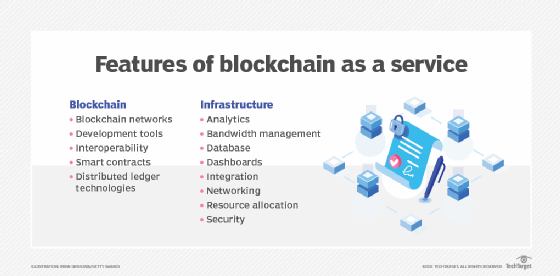8 blockchain-as-a-service providers to have on your radar
You don't have to build your blockchain project from the ground up. These cloud-based service providers can provide the necessary infrastructure, networking and development tools.
Imagine if, 20 or even 30 years ago, companies could have realistically adopted cloud-based ERP. Packaged, server-based ERP software might never have been a thing, and small organizations might have had access to the same tools as their large competitors.
It's 2024, and enterprises looking to adopt another rapidly growing technology, blockchain, have that option. Thanks to the maturation of cloud computing and a burgeoning marketplace of blockchain as a service (BaaS) providers, organizations can adopt blockchain technologies without investing in the underlying infrastructure.
What is blockchain as a service?
BaaS is a type of third-party managed service that provides a managed blockchain as well as its supporting network and development tools.
"With BaaS, you don't have to worry about the bottom parts of the stack," said James Wester, research director of cryptocurrency at Javelin Strategy & Research. "You don't have to worry about the protocols. You're just able to build applications across a blockchain network."
Numerous industries have already proved the value of BaaS services, including financial services and telecommunications.
 Ronak Doshi
Ronak Doshi
Blockchain represents a potentially transformative approach to data for any industry, with all the data contributed by the members of a complex supply chain or value chain verified, secured and made available to all entities participating in the blockchain. But as with many new technologies, the complexity and expense of creating, operating and maintaining a blockchain's underlying infrastructure have proved to be a significant barrier to companies looking to dip their toes in the blockchain waters.
"One of the challenges for enterprise blockchain adoption is the ecosystem readiness to make it easy to build and easy to buy blockchain technologies," said Ronak Doshi, a partner at Everest Group.
Next stop: Blockchain
That's where blockchain-as-a-service companies come into play. BaaS gives organizations a quicker and less complex path to experimenting with blockchain, and it also provides a platform for building and running blockchain applications, which act on all of the data flowing through a value chain. Wester said this is critical because blockchain participants can apply analytics to the entire ecosystem's data rather than just their own data, thereby learning things they might not have otherwise.
Providing enterprises with the ability to work with blockchain technologies without the upfront infrastructure investments means the BaaS market could further blockchain adoption in much the same way SaaS companies increased cloud adoption in the past decade.
 Avivah Litan
Avivah Litan
"BaaS services will help spur mainstream enterprise adoption of blockchain," said Avivah Litan, an analyst at Gartner, in an email.
How much adoption BaaS will foster remains to be seen. But Gartner predicts blockchain will add $3.1 trillion in value to the global economy by 2030. Whether the market ultimately bears that out, it's clear that BaaS providers play an important role in the market's development. In its "Hype Cycle for Blockchain and Web3, 2022" report, Gartner characterized enhanced BaaS as being on the upswing and likely to peak in two to five years. Litan said enhanced BaaS is a new generation of BaaS providers that focuses on the data exchange needs of specific industries.
Given that most enterprises will be drawn to the technology by the idea of running analytics apps on top of a blockchain, there is a certain set of core features they will want to look for. Most, if not all, BaaS providers will offer the following:
- Platform architecture management.
- Modular, preconfigured networks and infrastructure.
- Bandwidth management.
- Resource allocation.
- Data security.
- App-building and monitoring tools.
- Support for smart contracts -- automated agreements embedded in blockchain code.
- Dashboards to view and analyze code.
- Auditable transaction records.
- Built-in connections to needed services.
- Professional services.
While some BaaS vendors have been offering their services for several years, Wester cautions companies to temper their expectations. After all, we're still talking about a nascent technology, and few organizations possess the expertise to build blockchain apps, much less blockchains themselves.
"Blockchain is still a work in progress," Wester said. "We still don't know all of the things that are going to go into long-lasting, successful blockchain applications."
He also said it's difficult to make clean ROI calculations for a technology that's shared across multiple organizations and might deliver more value at times for one organization than another.
That said, blockchain has the kind of potential enterprises can't ignore. If they're looking to give it a go, they might as well have some idea of where to turn. With that in mind, what follows is a quick look at eight BaaS providers -- in no particular order -- that should be on the radar of any enterprise looking to experiment with blockchain.

1. IBM
One of the most mature blockchain services on the market, the IBM Blockchain Platform is built on the Linux Foundation's open source community-based Hyperledger Fabric. It has already had plenty of success supporting blockchains. Its Food Trust blockchain is bringing more transparency to the food supply chain, and it's transforming trade finance for a consortium of 15 European banks collaborating over the WeTrade blockchain network.
2. Amazon Web Services (AWS)
As it is in any market that relies on cloud-based computing, AWS is a BaaS force to be reckoned with. The Amazon Managed Blockchain is a fully managed service that supports the creation and management of scalable blockchain networks. Its Quantum Ledger Database serves as a centralized, verifiable transaction log. Unlike many of its competitors, AWS has options for running on either the Hyperledger Fabric or Ethereum blockchain frameworks. However, support for QLDB is scheduled to end on July 31, 2025. AWS said customers can migrate to its Aurora PostgreSQL database for common ledger database use cases.
3. Oracle
Never one to be left on the sideline of any enterprise technology trend, Oracle offers two BaaS approaches. Its Blockchain Platform Cloud Service works like any traditional SaaS offering, with subscribers able to quickly set up Hyperledger Fabric blockchains. Alternatively, Oracle offers an on-premises version in which it deploys a preassembled blockchain that runs as a software appliance on virtualization hypervisors.
4. SAP
Wherever Oracle is playing, SAP is likely to be nearby, and blockchain is no exception. The company's website doesn't do a great job of clearly explaining SAP's blockchain options. However, the company offers several blockchain-based products, including SAP Business Network Material Traceability; Green Token for supply chain sustainability data; SAP Pharma Blockchain POC app for prescription returns; and Blockchain Business Connector, which extends SAP's integration tools to bridge the transactional and analytical systems involved in blockchain applications. SAP also offers a detailed explanation of blockchain.
5. Alibaba Cloud
Buying blockchain technology from China might seem like heresy to some U.S. companies given the ongoing security tensions between the U.S. and China. But with so many countries buying just about everything else from China, why not consider a mature BaaS offering that claims to be the service with the largest number of primary patents? Alibaba Cloud BaaS offers all the needed features and functions. Plus it can run on Hyperledger Fabric, AntChain or Quorum.
6. Hewlett Packard Enterprise (HPE)
Since it entered the BaaS market in 2017, HPE has focused on the distributed ledger technologies of blockchain with its Mission-Critical Distributed Ledger Technology. In doing so, HPE has targeted environments that demand 100% fault tolerance and says it is focused on bringing enterprise-grade capabilities to blockchain workloads.
7. VMware
It's no surprise that the champion of virtualization would play in this space. The VMware Blockchain for Ethereum promises enterprise-grade reliability, scalability, ease of deployment monitoring and management as its next chapter in the blockchain saga. More importantly, VMware's existing BaaS entrant has proved itself in deployments in financial services, supply chain and healthcare.
8. R3
It's not a household name compared to the other big BaaS providers on this list. But R3's Corda BaaS platform has the attention of analysts, and the vendor claims its distributed ledger technology has made it a popular choice for financial services firms. R3 bills Corda as a permissioned ledger, asset modeling tool and workflow routing engine bundled into one platform.
But wait, there's more
These eight vendors don't represent the entire BaaS market. Organizations can turn to the frameworks themselves and experiment with establishing blockchains on Hyperledger Fabric or Multichain.
Likewise, they can try smaller companies, such as Kaleido. This full-stack BaaS platform supports the management of blockchains spanning multiple clouds. Another player is Dragonchain, whose serverless cloud architecture focuses on protecting vital business assets and data.
Small vendors are well-represented among the industry-focused enhanced BaaS providers identified by Gartner's Litan. These include Vendia, which manages a blockchain BMW uses to exchange data with auto parts suppliers, and SettleMint, a blockchain piloted by beverage-maker AB InBev to provide transparency and traceability in its barley supply chain. The Vatican uses ShelterZoom to tokenize archived documents to make them securely accessible online. A hospital in Argentina uses the platform to provide patients ownership and control over their medical records.
Christine Campbell is a freelance writer specializing in business and B2B technology.
Tony Kontzer was a California-based freelance journalist who covered technology for more than 20 years.







